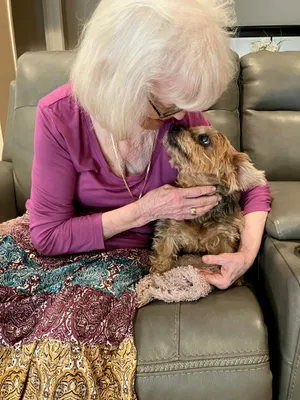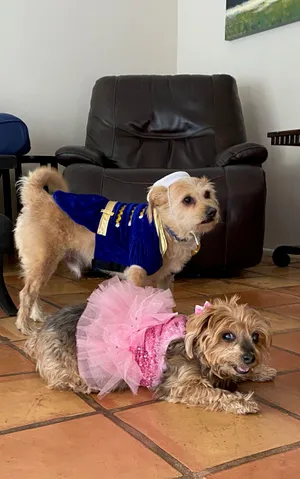My dog died two months ago. Pet loss causes deep grief that our society ignores.
This is the fourth story in a series exploring grief, how people face it, cope with it and heal from it. Click here to read the last installment, and share your own grief story with us at the bottom of this article.
I knew the day was coming. Still, there was no way to fully prepare.
My family first noticed our 15-year-old Yorkie, Gigi, had trouble breathing in late August. Each of her breaths became more and more labored until, almost all at once, she stopped eating, then drinking, then walking. All she could do was lie on the floor, conserving her energy for each and every laborious, haggard inhale and exhale.
A veterinarian confirmed the worst: Gigi either had severe bronchitis or the masses found in her lungs from a previous X-ray were cancer and spread. Either way, the prognosis was the same.
It was time to say goodbye.
Pain over the loss of an animal occupies a unique place in the realm of grief. Sure, pets aren't people − but many people love them just the same. I loved Gigi just the same.
"This loss feels, for some people worse than human loss," pet loss grief counselor Beth Bigler says. "Of course, people feel guilty about saying that. But the proximity that our animals have, the intimacy that they share in our lives and the connection, the deep feelings that exist between guardians and their animals make this type of loss especially hard."

A disenfranchised grief
Bigler describes pet loss as a disenfranchised grief, or "a type of grief that isn't really openly acknowledged or socially mourned or publicly supported." Miscarriages and divorces, she says, also fall into this category.
"In other words, no one's bringing over a casserole when it's an animal," Bigler says. "You don't get bereavement days off work for that."
Psychotherapist Stephanie Sarkis says people grieving animals also face judgment from others who think their grief is overblown or inappropriate.
In reality, the pain of pet loss can be overwhelming. Many people, Bigler says, experience shock, disbelief, sorrow and brain fog. Some even have physical symptoms, like heart palpitations, stomach pain and extreme fatigue. After all, grief, she says, is exhausting.
Her son died, and she felt alone.In her grief, she found YouTube.
Sarkis adds pet grief can also put people at an increased risk for suicide.
"For a lot of people, that's the being that they're closest to," Sarkis says. "Your cat or dog is there to greet you every day. It gets easier with time, but it can be just as painful as a close human family member dying, so it needs to be taken seriously."
The innocence of pets also makes their loss more heartbreaking.
"When's the last time your pet lied to you or made you feel bad about yourself or held an unrealistically high expectation for you?" Bigler says. "Our animals are the givers of unconditional love and acceptance, which is something that many guardians haven't always received in their lives."
Of all the feelings that accompany pet grief, the loudest is often guilt. Because pet owners are responsible for their animals' medical decisions, many wonder if euthanizing was the right choice.

The night after Gigi's death I sat with my mom on the couch. We talked about the last few days. We talked about Gigi. Previously my grandmother's dog, Gigi became ours when my grandmother moved into a senior living facility and could no longer care for her.
"I knew we wouldn't have her very long," my mom said. "I knew I shouldn't get too attached. But when I looked at her, all I saw was unconditional love.
And I couldn't help but fall in love too."
The spiritual questions of grief
The hardest part about grieving Gigi was the spiritual doubt that followed.
In my grief-stricken mind, I couldn’t help but wonder: Would I ever see Gigi again? Human death, at least, offered the possibility of heaven. But what about my dog? What about my sweet, little dog?
"A lot of my clients want to know, will I be reunited with my beloved someday?" Bigler says. "Even if you aren't sure what exactly your belief is, if you're finding comfort in the idea of a reunion, let's take comfort in that, because that feels supportive to you right now."
The day before Gigi’s death, I prayed – desperately, frantically prayed – for her not to be alone after our final goodbye.
Two people from Peaceful Pets Services came over the next day to put Gigi to sleep. My family couldn't have asked for two kinder, more gentler people for the process. They let us hold Gigi on the couch one last time. We shared memories from our time with her. We talked about her love of ribbons in her hair and her mighty appetite and her princess Halloween costume. We talked about how, when my grandmother had a stroke, Gigi supported me as I took care of my grandmother through the aftermath. We talked about how much we love her.

When we were ready, they administered the euthanasia. Within seconds, her life and suffering were over.
Later that day, I took a nap and had a vivid dream about Gigi. I saw her as a puppy, standing in front of our fireplace − vibrant and happy and full of life. I reached out to touch her and could feel her fur as real as if I were awake.
I don't know what this dream means. I don't know if it means anything. But I do know that each day since, when I look at Gigi's ashes on our fireplace mantel, the pain has gotten a little easier.
And I know that, one day when I look at them, my grief will melt into gratitude for that touch of unconditional love that was called Gigi.
Fired at 50, she'd lost everything:Then came the grief.
Disclaimer: The copyright of this article belongs to the original author. Reposting this article is solely for the purpose of information dissemination and does not constitute any investment advice. If there is any infringement, please contact us immediately. We will make corrections or deletions as necessary. Thank you.






